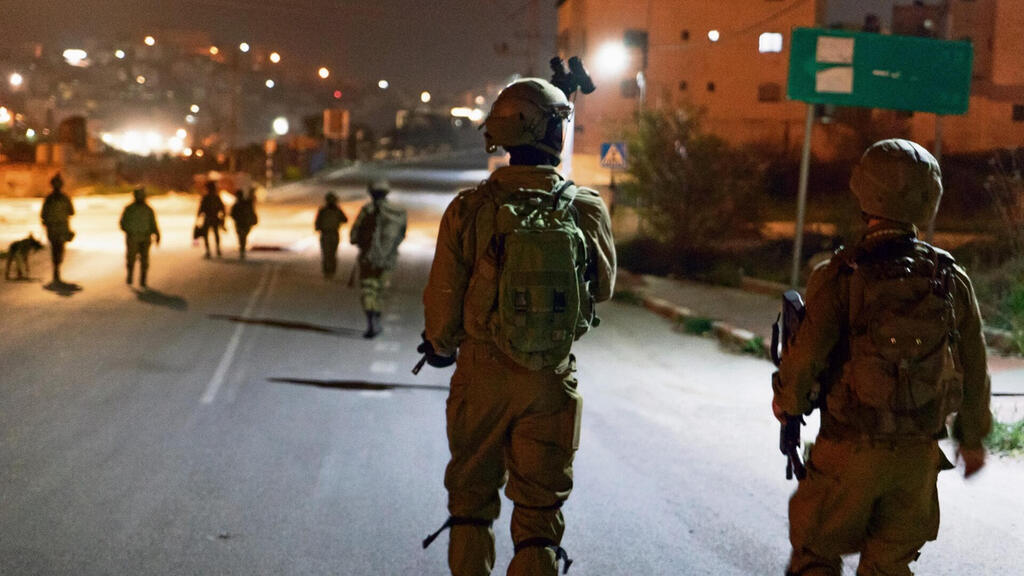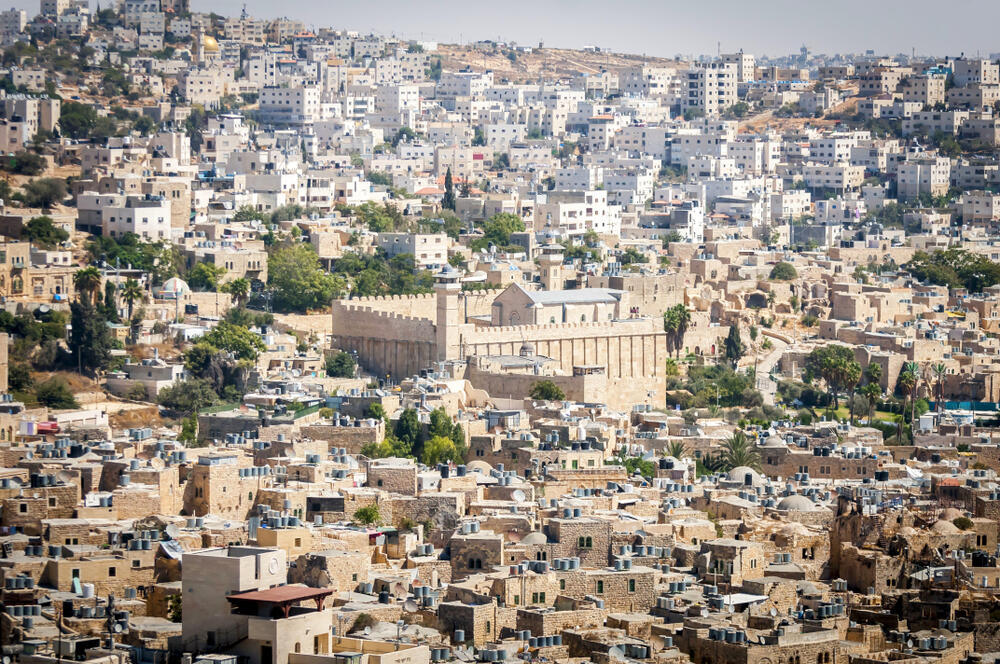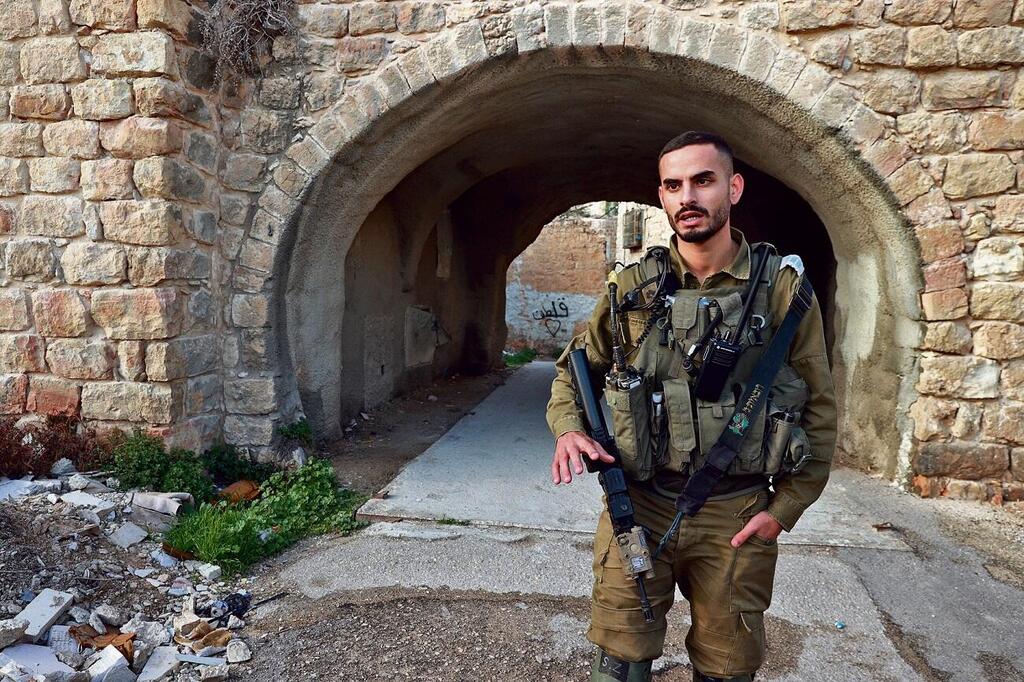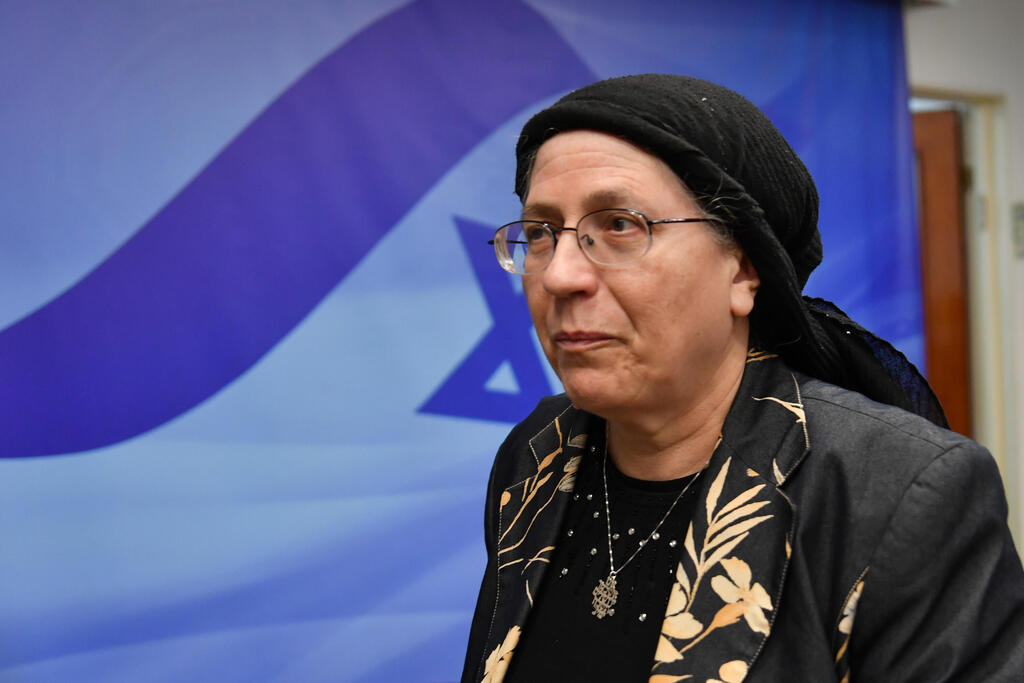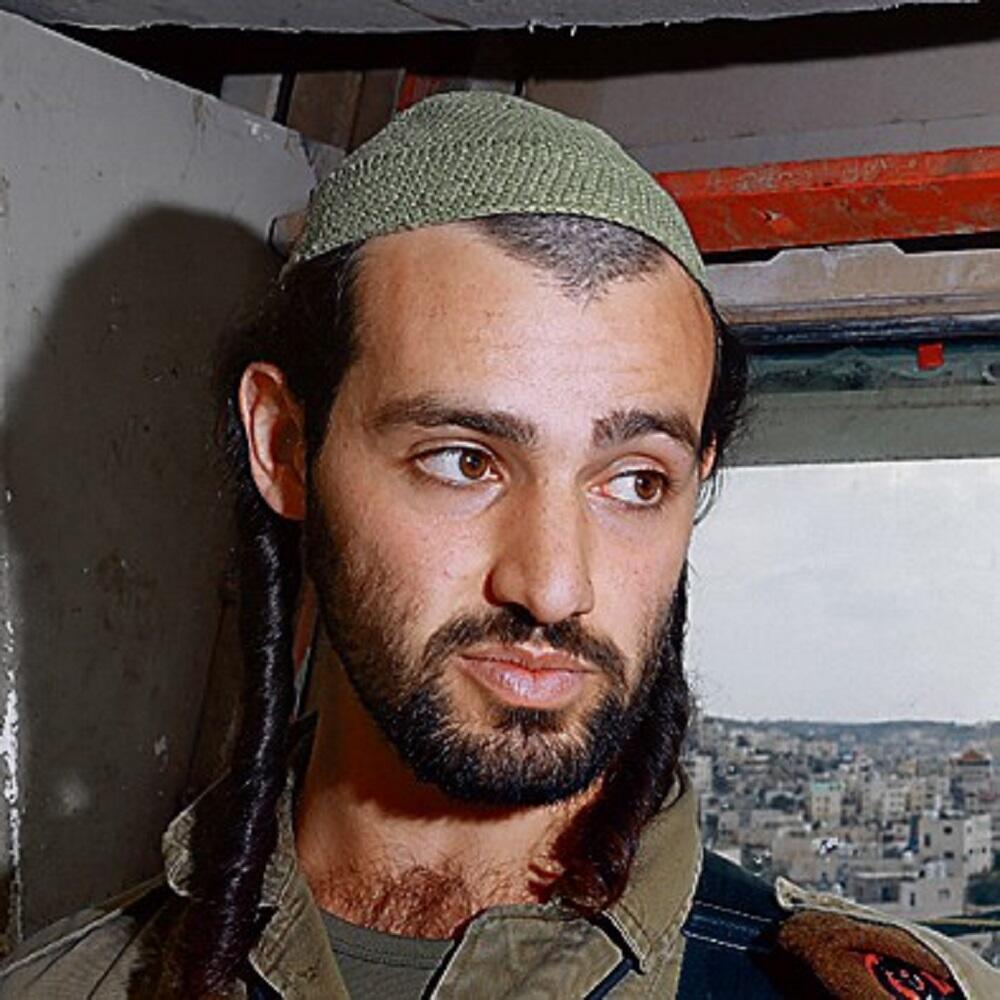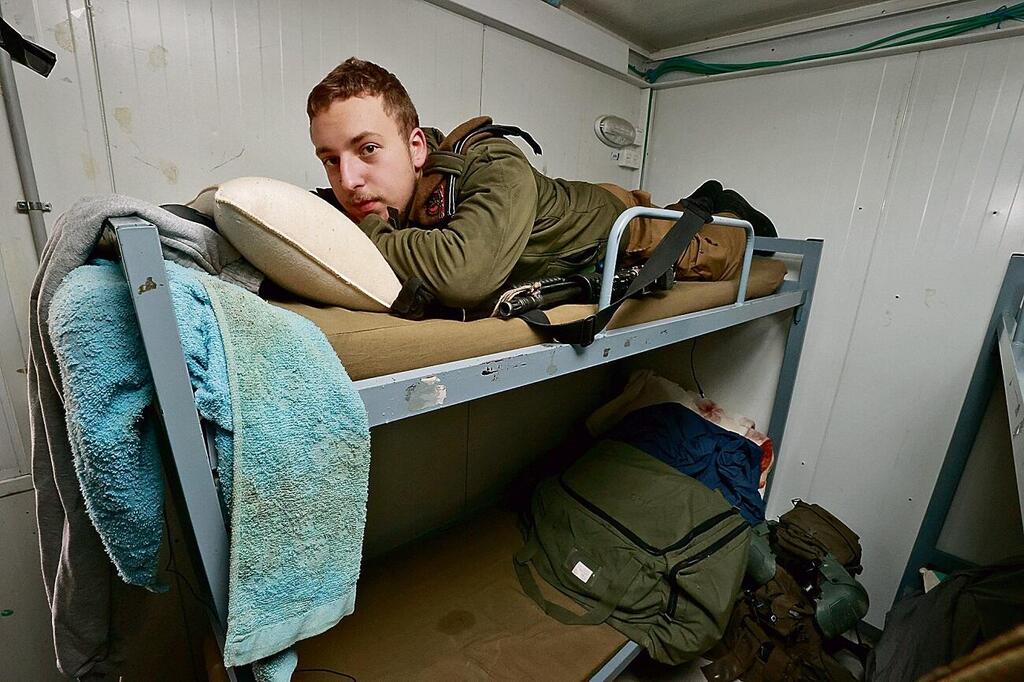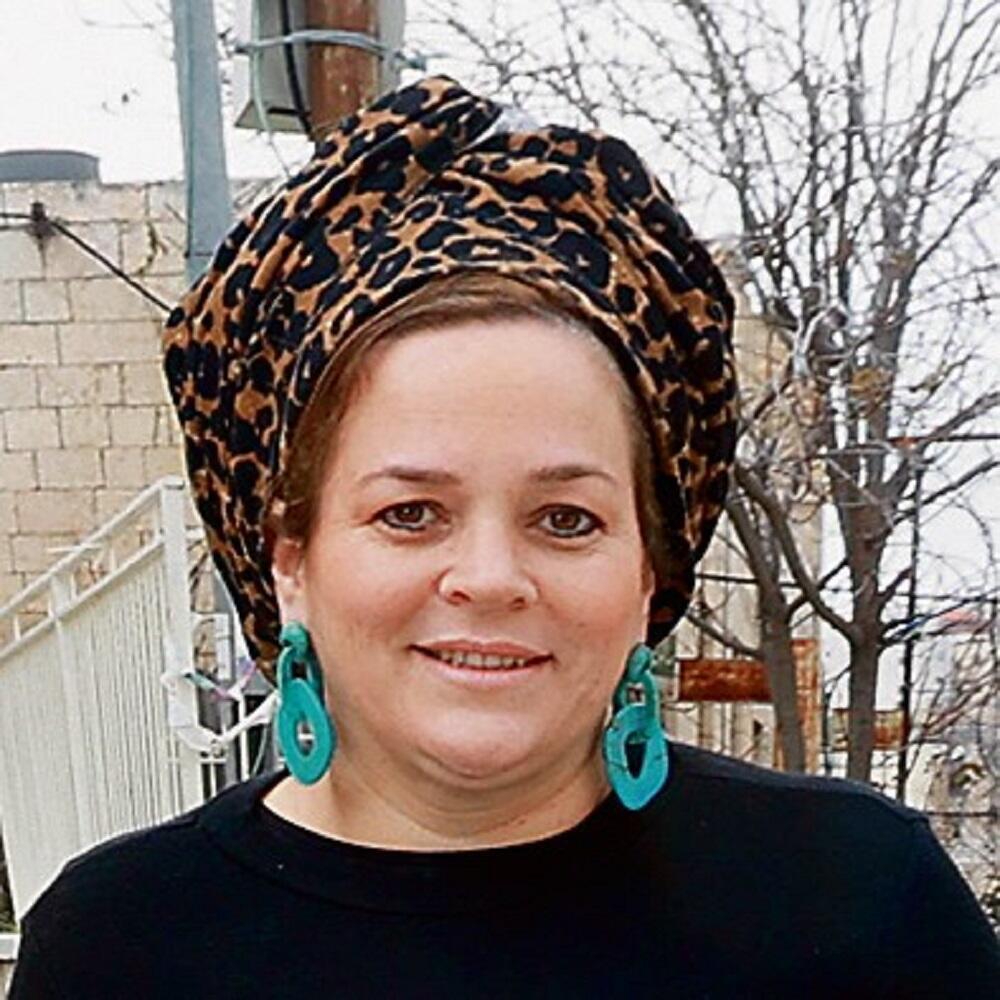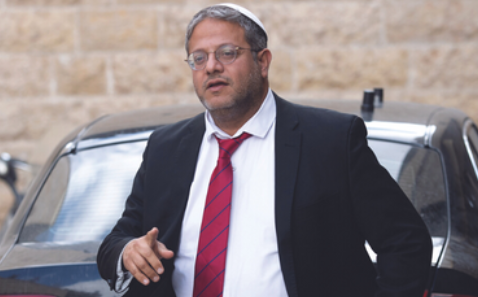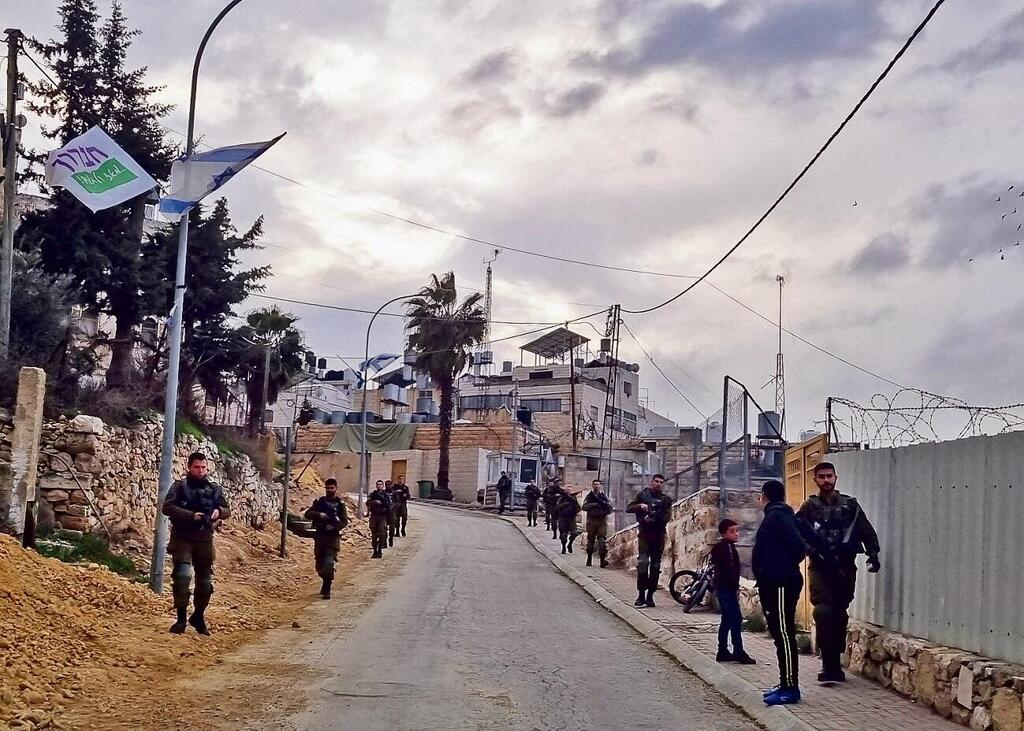Getting your Trinity Audio player ready...
It’s 2 am in the Al-Jabari neighborhood of Hebron.
A solitary dog barking breaks the night silence. More dogs join in. You can hear the footsteps of brown boots. 15 soldiers from the Golani Brigade’s 51st Battalion, two female Oketz soldiers and a dog named Mun are silently making their way through the empty city of Hebron. There’s a full moon overhead. The sky above is dense. Man’s actions. God’s silence.
Related stories:
That dog’s barking again.
Silhouettes of soldiers dart through the window. There’s a barrel of a loaded gun next to a clothesline. There’s chaos and screaming. The house’s residents are gathered in one of the rooms. The soldiers are scouring the house, turning over sofas and carpets. They walk in and out of the rooms time and again. They move wardrobes around, knock on the walls. Intelligence sources say that in this house, or one nearby, lives an armed Palestinian, a former prisoner who’s hiding a weapons cache.
On our way here, as we were rocking from side to side in the jeep, 2nd Lieut. B. pointed at the soldiers behind him. Some, for fear of being photographed by the locals, donned ski masks. “You have a crew of Golani soldiers who are hungry and angry. From what we know about the guy we’re looking for, we can assume he’s no Israel lover and doesn’t do volunteer work in his spare time.” He continued to tell us about the man whose house we were approaching: “It’s a shame he’s destroying his family for this. You’re gonna see babies and little girls.“
I see them now sitting in a golden room with sofas, ornaments, and elegant teapots. I make out five children, two men and a woman with a baby sitting there in silence. Their gazes are frozen. The men are smoking. As if nothing’s going on, there’s a television flickering with children’s programs playing. “Look,” says B. and he points at the doorway with a Hamas symbol over it. When I raise the issue of conscience, he responds “You go into these houses. You see Hamas symbols and pictures of terrorists. These are their heroes. We have ours. It’s OK, but you know you’re not on their side.“
Mun the dog, whose specialty is finding gunpower, is in deep. He’s climbing on the armchairs, sniffing the pillows. As he goes into one of the rooms, a woman in headscarf climbs onto the sofa, frantically shouting. The father and son run in, shouting “Oskot!” (Quiet!).
“I see you brought your shoes this time.”
2nd Lieut. B. laughs. He tells me that he used to live in the Giv’at Ha’avot neighborhood of Hebron, two houses down from Itamar Ben-Gvir. “He was a great neighbor.” He regales how they’d play soccer together as kids and how he’d invite the neighbors over for steak on Independence Day.
Five months ago, following the terrorist attack next to the Ashmoret checkpoint, that killed Ronen Hannania, B. rushed out of his house barefoot and wearing shorts. "I positioned my gun over the car. I saw the terrorist in the crosshairs and I fired three shots.” B. tells us that Hebron’s military security coordinator ran over the terrorist. "I didn’t know what his condition was. I shot. Shattered glass then penetrated my leg. Two guys from the rapid response counter-terrorism unit (kitat konenut) showed up. They saw a barefoot guy in shorts and they thought it was another terrorist. I shouted ‘IDF. IDF. Don’t shoot.’ Soon after, I was told that the chief of staff was coming to Hebron and wanted to talk to me. I told them that I couldn’t as I moving apartments.”
“If someone wants to carry out a terrorist attack now, he can just slip a gun out of a window. He doesn’t even need to leave the house. Hebron is rampant with ammunition. It’s just about whether they decide to use it“
Four am, two hours later, after they found nothing, 15 Golani soldiers, two female Oketz soldiers and a dog named Mun marched out of Al-Jabari. More sounds of footsteps. More barking. One of the soldiers, Hiuk’e asked to stop at the kiosk to buy a bottle of coke. He hadn’t been anywhere near a Shekem for two weeks. He’s told it’s not the right time, that they have to hurry.
The sky overhead looks even thicker now.
'The most beautiful and threatened country in the world'
Three months earlier.
Sahar Zafrani is listening. He announces: “Kalashnikov.” Company Commander (CoCO) Zafrani, or “Zizu” as everyone calls him, has a sharp ear, perhaps even a mystical sense of sound. 20 seconds earlier, he said that we’d hear rounds of gunfire from the Palestinian neighborhoods. Boom. It happened.
Zizu is expected to be appointed as a commander in Sayeret Golani. His office is adorned with certificates of appreciation, including one for action on the Gaza border.
It was late one night in 2018 when a report came in about two men approaching the fence at Kerem Shalom. Zizu got out of his vehicle and ran with his fellow combatants. “I timed when to shoot. No one fired. I knew that if I didn’t fire the first shot, no one would shoot.” He recalls that one terrorist was killed. The second raised his hands to surrender. When a flare illuminated the border, Zizu got the full picture: One terrorist was killed on the fence. Behind, he could see the lights from Kerem Shalom. “I knew that if I hadn’t been there, people would have been killed. I felt it all rested on my shoulders. “
Now in Hebron, as Shabbat comes in, there are patches of cloud in the sky. It’s as if God is sprinkling the local spices over the city: a gentle sweet ‘n sour mixture of sanctity and danger. An ever-increasing procession of worshippers makes its way from nearby Kiriyat Arba, via the “Southern Gate.”
It's a unique sight: Old and young, women in their Shabbat clothes, many sporting guns across their backs, marching to the Tomb of the Patriarchs. They’ll hand in their guns at the entrance. The Muslim call to prayer, the muezzin, is chanting in the background. They make their way, deaf to their surroundings. Every hundred feet or so along the winding path deep into the city of Hebron stand a duo of soldiers. The ”Nir Gate” is followed by the “David Gate.” Further uphill, two companies are dispersed. “Shabbat Shalom, Shabbat Shalom.” The residents greet the soldiers as an old lady hands them sweets.
Zizu watches the procession. He had taken us to the “Alley of Courage” along the route, where 20 years ago, a fatal attack killed 12 soldiers and security personnel. “If someone wants to carry out a terrorist attack now, he can just slip a gun out of a window. He doesn’t even need to leave the house.” Zizu explains: “Hebron is rampant with ammunition. It’s just about whether they decide to use it.“
The Givati Brigade’s Tzabar Battalion, who were posted here before Golani, included the soldier who shouted “Ben-Gvir will sort things out in this place.” The Golani Brigade will end their stint here battered and bruised. Over the next three months, with the West Bank ablaze, everything will happen: a car ramming, a soldier will assault a human rights activist, violence at the Harsina outpost that will rock the country, intermittent Molotov cocktails, stone-throwing, house raids for ammunition... everything.
But this evening, as Shabbat descends to the melodies of Shabbat songs alongside the muezzin, it’s as if Hebron has taken Ritalin. She’s contently and comfortably lying on her back with a wet towel across her forehead. “This is our country,” Zizu tells us. “The most beautiful country in the world, facing the greatest threats in the world.“
'A Hamas city, dangerous by nature'
There are places you either love or hate. Places where you either develop some kind of syndrome or you flee: Jerusalem or Bombay. Or Hebron.
Looking over the mountainous rocky terrain, on a clear day, you can see as far as the time of the Patriarchs. The bitter cold goes straight to your bones. Centuries-old dilapidated stone buildings, checkpoints, outposts, barbed wire, pillboxes - the very best military tools. All this, the charm and the neglect, the prayers and violence, are all mixed together, not necessarily blending very well.
Col. Yishai Rosilio, the Judea Brigade commander in charge of the Hebron sector, pulls his coat tight, as the wind blows around him. "You can stand here and imagine ancient times." Squinting a little, he continues: "Stones and wide-open spaces, cities built one layer on top of another. And we’re another layer.”
This is where you have to start talking about Hebron. Right here. Rosilio points beyond the Tomb of the Patriarchs, sacred to two peoples, stuck in the middle of a city of 300,000 Palestinians living beside less than 1000 Jews. A senior officer told me that when Abraham put the cave here, he wasn’t thinking about the convenience or otherwise of defending it.”
There’s construction going on outside the Tomb of the Patriarchs. They’re building a wheelchair lift. Rosilio explains that “for this lift, they had to do situation assessments on situation assessments. It went all the way up to the minister of defense to gauge whether it would lead to agitation. Everything here is sensitive. Everything is nuanced. If you want to fix up your bathroom, it’s an incident. If you want to build anything, it’s an incident. You want to make something wheelchair accessible – even that’s an incident.“
Hebron is a complicated city. It’s not just about Jews and Arabs. It’s complicated in Israeli society. For the right, it represents the yearning for expansion and redemption. For the left, it represents occupation in the heart of a Palestinian population. “It must be understood profoundly. Anyone wanting to talk ideology from either side, comes to Hebron. “Rosilio adds: “The city is generally quiet and prosperous, but beneath the surface, it’s very much a Hamas city, and dangerous by nature.”
He takes me on a tour of the city. He alludes to the various aspects of the city that have been stirring up Israeli emotions for years. Here, on the right is the “Avraham Avinu” neighborhood where a few dozen families live. Built like a fortress, this neighborhood was founded on the ruins of homes of Jews who lived here before the 1929 riots. And here, in the apartment with the pergola is where cabinet minister, Orit Strock, lives.”
We ascend towards the Gilbert crossing where in 2016, next to an IDF post, Elor Azaria shot a terrorist lying on the ground – an incident that rocked the nation. Then, in one of the alleys, we meet CoCO Alexei briefing the soldiers. Tonight, they’re carrying out an operation. “With the grace of God, if necessary, we’ll also kill a terrorist,” Alexei tells his men. The following day, it was reported that seven wanted men were arrested in the Fawwar refugee camp.
We move on to the peak of Tel Rumeida with its panoramic view of Hebron, the city’s surrounding area and its challenges. The conflict becomes more acute: A Jewish home sits next to a Palestinian home and, you’ve guessed it – a military post. It’s all in extremely close proximity.
We then spot Baruch Marzel, totem of Israel’s far-right, taking out the trash.
Then Hebron, Abraham, the Six Day war, Baruch Goldstein, Azaria, Ben-Gvir, Strock and a struggling Palestinian people and an unsolvable dilemma. The Golani Brigade’s 51st Battalion has been tasked with this scenario.
“Every step here is on a historical path.” Rosilio smiles as we part. “It’s all very intense. I look at the good things and I’m prepared for the intensity of the bad things.”
'You see a soldier clutching a gun, you sleep better at night'
Erev Shabbat at the bunker post, Harsina.
Sgt. Menachem Cohen sings to himself a Shabbat song: “Rest and happiness, light to the Jews. Day of rest. Day of delights.” The guard post is a bit depressing. Nothing happens here. Neither cars nor people pass by. It’s frustrating for an ultra-Orthodox soldier forced to break Shabbat in a post like this.
But Menachem has made his peace: “Home is something you have to defend.” When he says home, he means the settlement of Otniel. “Here.” He points south “25 minutes from here.“
He has four hours to kill in the bunker. While he’s here, he thinks back to the chaotic security situation in which he was raised. He remembers the soldiers standing tall on the roads and at the checkpoints. He could feel safe knowing that there was someone standing guard.
He had neighbors who were murdered in terrorist attacks. The first, Dafna Meir, was stabbed to death by a terrorist in January 2016 in front of her own home. She lived a few houses away. He knows her son. Menachem was 14, studying at a yeshiva high school in Dimona. He remembers the day of the attack: the rumors, trying to call his parents, news reports. “It was a strange feeling. You don’t know what you’re allowed to feel. You feel rather disconnected.“
Tragedy hit once again six months later. Father of ten, Rabbi Michael Mark, head of the hesder yeshiva in Otniel, was murdered in a shooting attack on route 60. The rabbi’s son, Menachem’s friend, was in the car at the time. “The media published a picture of the vehicle. I remembered the registration plates. I didn’t say anything, just waited for an official report. At times like these, a lot of catchphrases are banded about: ‘life’s short,’ ‘life’s here,’ life’s there.’ And then comes the blaming: ‘Where were the security forces?’ ‘Where were all the people?’ After an incident like that, you then see a soldier clutching a gun, you sleep better at night.”
The next time we met Menachem he told us about a recent stabbing at Havat Yehuda in the South Hebron Hills region. The victim had been a neighbor. “As an adult, you experience it differently. It’s an ongoing battle, and a people who don’t want us to exist.“
Menachem has become the character he’d had in his mind for years – the soldier providing children with security. At this outpost, there aren’t any real threats. Menachem explains: “Our sergeant calls it letting them sleep better on their pillows.”
'We’re fighting for a future, not our history'
Zizu lights up a cigarette, looks around with that suspicious look he has sometimes. He then says something that sounds a bit absurd “The fact that we’re here and nothing happens is itself an incident.”
As we stand opposite the kiosk which only a few short months ago witnessed that deadly shooting incident, his eyes are darting around following a rickety old car making its way up the hill, or two locals in hoodies looking across the street who then come closer. He asks them to keep their distance.”
So, the nothing here is an incident. That needs to sink in: With the exception of a stone about to be thrown at a post from a Palestinian school, the field is quiet. Zizu explains: “It’s not luck. If you mess up, you get hurt.”
It's freezing cold, and temperatures drop even further as evening falls. Zizu lifts his foot and puts out his cigarette on the back of his shoe.
He got the nickname Zizu during basic training. A Druze soldier found it hard to pronounce the name “Zafrani” and “Zizu” was what came out. “Now, that’s the only name I have,” he says with a chuckle. “I tell people it’s from [Zinedine] Zidane because I’m good at soccer.”
He's 26. In eleventh grade, he couldn’t have imagined he’d be where he is today. He grew up in a difficult neighborhood. “I wasn’t a great student. My environment was pretty negative. The role models you have aren’t of those doing more for the country, but rather those doing less.” He describes being raised surrounded by violence and drug addicts.
His elder brother fought as a paratrooper in Gaza in Operation Zuk Eitan in 2104. “I then learned that my grandfather had been in the Golani Brigade. He fought in the Six-Day War. In a way, it made me decide what I wanted. I was initially assigned to the Armored Corps (Heil HaShiryon). He then said it would be Golani or nothing. He refused to leave the Reception and Sorting Base (Bakum) if he wasn’t assigned to the Golani Brigade’s 51st Battalion.
11 View gallery
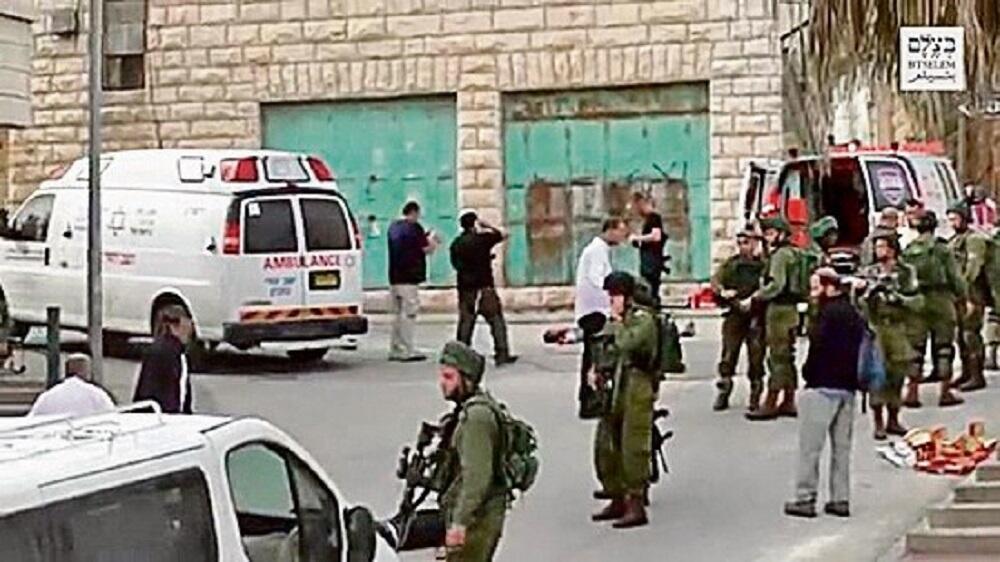

The scene where Israeli soldier shot a neutralized Palestinian terrorist
(Photo: Screenshot)
We carry on walking. At Junction 206, there’s a Palestinian standing on a stone house. He’s looking out. The Jabel Jawar neighborhood sits to our south. To our north is the eastern casbah.
Hebron is divided into two parts. The H1 sector is governed by the Palestinian Authority and H2 is governed by the IDF. There’s a sort of coexistence between the two peoples. To be more precise, just existence - the kind that’s sometimes breached by shooting or stabbing. Zizu tells us: “I’m from a mixed city. I know what it’s like living beside Arabs.” He tells us how, during the 2021 Guardian of the Walls (Shomer Hahomot) operation in Gaza, cars were overturned and garbage cans were set on fire. “When I was on the Gaza border and the rocket siren went off, I felt safer than my family did at home.“
Passing by broken stone buildings we see trash, cats and concrete barricades boasting a black cross spray-painted over a graffitied Israeli flag, we make our way towards the Erez Alley.
As we reach the Tomb of the Patriarchs, I ask Zizu if this blood-drenched struggle over the holy site is really worth it. He quietly responds: “Yes, it’s worth it. If we don’t fight for our history, it’ll be erased. It’s a just struggle.“
A skinny guy in long peyot (sidelocks) stops, listens in and corrects Zizu: “We’re fighting for a future, not our past.”
“It depends on how you look at it,” Zizu responds. “If we don’t fight for our history, they’ll rewrite it. It’s been tried.“
“We’re not fighting for this place because it belonged to my father. We’re not here to prove who’s the bigger man” the skinny guy says. “We believe that to spread light to the world, the People of Israel, by going back to our roots, must protect our own space.”
That last sentence started echoing in my head. The more the People of Israel protects its own space, Huwara will burn. Cars and houses will burn. Spreading light to the world you say?
'I froze, she started crying'
Sgt. Shlomo Reshetnikov was supposed to have left for home some time ago. He was given a six-hour detention before leaving base. It’s annoying to spend 17 days in Hebron and then get stuck on base. He sighs. It’s snowing and raining at the same time, and it’s so cold that you can feel it in your little toes.
Two hours detention were for being late for roll call and the other four were for sitting down while on guard duty. He tried to explain: “There was another soldier with me who was standing. I thought it was alright if one of us sat down.” It’s not a very good excuse. Either way, he has a bit of time to sit with us before going home to his girlfriend, Esther.
He's a lone soldier who made Aliya from Volgograd in Southern Russia at the age of 14. A year before his Aliya, representatives from the “Na’ale” program showed up at his school and got him excited about Israel. His father was against the idea: “Who do you have waiting for you there? You don’t know the language. You know nothing about Israel.” He attended a boarding school, and then on to Golani.
His parents know he’s in Hebron. They don’t really know what that means. He doesn’t tell them about it. We’re just after the targeted assassination in Jenin and the following terrorist attacks in Jerusalem. The following day, there was an attempted stabbing attack in the Fawwar refugee camp not far from here. The Palestinian who tried to stab a soldier was killed.
Three months ago, after not seeing each other for two years, his mother, Natalia came to visit. He found it hard. He sighs, holding his head in his hands. He describes meeting his mother at Ben Gurion Airport: “It was really difficult. I froze for ten seconds.” She looked around and didn’t see me. I then gave her a huge hug. She then started crying.”
The rain has now stopped. Fog has begun covering Hebron. It’s like the fog over us. Shlomo sighs again. “Thank you for helping me pass the punishment time,” he says in slightly broken Hebrew.
Yaffa Bleichbard moves the white lace curtain and looks out through the window bars. We’re in one of her daughters’ bedrooms. This is the room in which she herself grew up. There’s a big teddy bear on the comforter on the bed.
She gestures across the road towards the neighborhood where they sometimes throw stones from. She says that there have been times when they’d shoot as she went out to hang the laundry.
It’s hard to comprehend, but Bleichbard doesn’t seem afraid. She’s not angry. She has good reason to feel that she’s being protected. There are border police, patrols, and cameras. Outside her window, there’s an IDF guard booth with an Israeli flag flying above.
Yaffa Bleichbard: "We’re not supposed to live like this. On the other hand, I have principles that guide me... A soldier makes it possible for my son to walk around freely, but at the end of the day, he’s protecting the rights of the Jewish People"
Soldiers surround the Beit Hadassah neighborhood in the heart of the Jewish part of Hebron. The Bleichbard family hears everything. It’s just the other side of the wall. “I know everything about the soldiers’ girlfriends. Everything. Yaffa describes the night-time conversations, how they shout at each other at the outposts. She does impressions of the soldiers shouting “ad matai” (until when?), and singing badly.
She lives in a 130-year-old house named “Beit Hadassah”, from which the neighborhood takes its name. The family arrived 40 years ago when Yaffa was three. Her father, Moshe Bleichbard, founded the “Shavei Hevron” yeshiva. Her parents eventually left and she stayed. She has nine children and a granddaughter, Lia.
She calls the building, which once served as a clinic, a “shattered dove of peace.” In the 1929 riots, the clinic director and his family along with further Jews were murdered. These included her mother’s great-grandfather, Rabbi Elimelech Lichtenstein. “The clinic provided free medical care to Jews and Arabs alike. Beit Hadassah was among the first buildings to be targeted in 1929. So, here’s the shattering. She has the right to live here, continuing that which had been severed. The dove with the broken wing. “We live under constant threat. We have Arabs around us. The Arabs aren’t the problem. We’re the problem. The more we establish ourselves as a people, the easier it will be for us to contend with the Arabs.“
We’re in the living room. She pours lentil soup from a pot that can easily feed 30. The soldiers and students here all know Yaffa’s soups. Lentil soup is for weekdays, chicken soup for Friday night.
I have two questions:
Firstly: Does all of this seem natural? “Definitely not natural. We’re not supposed to live like this. On the other hand, I have principles that guide me. When I raise my child in this way, I try to impart strength, values and meaning.”
Secondly: Is she comfortable with the absurd situation of many protecting the few – the 30 families or so live in the neighborhood? Yaffa responds: “True. A soldier makes it possible for my son to walk around freely, but at the end of the day, he’s protecting the rights of the Jewish People. We can’t get to the Tomb of Joseph because there’s no Jewish settlement there. You can get to Hebron. The soldiers must understand this. It’ll make guard duty easier for him.“
Chocolate instead of gunfire
Zizu won’t be making it to Sayeret Golani, at least not for now. It was all over Facebook – a violet video clip starring Golani soldiers and officers from the Judea Brigade at the entrance to Harsina. It starts off with foul language over the walkie-talkies - “Golani bastard.” Then Judea Brigade officers try entering the base and Golani soldiers won’t let them. Chaos ensues. Of all the companies in the universe, it was Zizu’s involvement in the bedlam. Following an inquiry, officers were reprimanded and dismissed and soldiers were punished. Zizu also paid a price. Instead of joining Sayeret Golani, he’ll be assigned an administrative position.
Brigade Commander, Col. Paley tells me: “There are lines you don’t cross. In the IDF, a company stands alone. I expect my men, even when it’s hard and it’s intense, to be responsible and exercise self-discipline.” Regarding Zizu, he adds: “It pains me to see a commander of mine punished. He and I both understand that this incident demands recourse. It says nothing about his future. We embrace him. I’m sure he understands the mistakes he’s made.”
Either way, on his first leave after all the bother, there’s a villa in Mitzpe Ramon awaiting him. With music playing in the background, dressed nicely in civilian clothing, Zizu gets down on one knee, gets out a ring and asks for his sweetheart’s hand in marriage. She says yes. After Zizu’s beloved’s tears, pyrotechnics are followed by a long embrace. “I find emotions hard to handle. It’s easier in Hebron.”
So, the company commander is looking ahead. “I’m like a cat. You can throw me out of the ninth-story window and I’ll land on my feet.” He doesn’t want to talk about things in the past. He classifies it as a marginal incident. He doesn’t want to wash dirty laundry in public. He’s still angry though.
“We have too many enemies to deal with this shit,” Zizu says. “Almost everything they said in the media was inaccurate. What really gets me down is that, without meaning to, we hurt the country.”
I ask Zizu what actually happened there. “The only thing guiding me through this whole stupid incident is what my soldiers’ parents expected me to do. The moment violence is aimed at my soldiers, I’ll be there. I’ll try breaking it up. Unfortunately, I couldn’t. It all erupted like a volcano and it spread like wildfire.”
“I’ve said my piece. I’ve been critical and I’ve accepted the decisions. We’re all grown-ups. The whole incident should have ended much earlier. I’m sad about the way it all turned out. “
Zizu recalls an incident last week: At two or three in the morning, in search of weapons, they entered a Palestinian house in the heart of Hebron. “There were at least five small children in the house, as well as a diabetic grandfather with a bad heart. The children were crying and the grandfather’s sugar levels were dropping. You set out on an operation looking for a guy you envisage sleeping with an M16 under his pillow and you imagine battle scenes in your head. And then you’re faced with a situation you’ve never seen before - a man almost dying in your arms. I stopped everything. I called the Red Crescent and I started spoon-feeding him chocolate spread to get his sugar levels up. If a person’s sugar level drops, it makes no difference if he’s Jewish or Palestinian.“
'A child can ask for Bamba and then throw stones at you'
There’s a Palestinian house opposite the Dror pillbox, the fortress dominating Hebron. A few children, aged three and upwards are watching us. The eldest, a girl called Malek dressed in a housecoat, has a curious look about her. She wants to know my name. I ask her what the gunshots in the background are. What gunshots? She doesn’t understand. Maybe they’ve become invisible to her.
One of the soldiers told us that it was celebratory shouting. “Allahu Akbar” etc. That evening was the terrorist attack in Neve Yaakov.
Menachem Hacohen and Eitan Reisch explain that these are the complexities of Hebron. A child can approach the checkpoint, ask for Bamba and then throw stones at you. “The very same person who calls you bro, who brings you prayer beads, or the child you to whom you give food – can throw a Molotov cocktail at the checkpoint later that day.”
We’re inside the pillbox. There’s a watchtower here surrounded by living quarters, a kitchen and showers. In the room we’re in, to our right there’s a field Aron HaKodesh housing a Torah scroll, to our left there’s a radiator.
Sgt. Reisch sounds frustrated. There was an operation arresting wanted men that he wasn’t called for. Maybe because it was the day before he got married. While they were stationed in Hebron, on the morning of his wedding, Reisch showed up at the outpost. He carried onto the Western Wall and to Rachel’s Tomb. After breaking the glass, he and his friends had to rush back to Hebron.
Reisch, 23, is the tenth of eleven children. They used to live in Atzmona in Gush Katif. Reisch was five when they were forced to leave. His memories are those of a child, intertwined with documentary footage he’s seen. He remembers the family living for five months in a tent near Netivot. “There was and mud and puddles. It was one long summer camp.”
11 View gallery
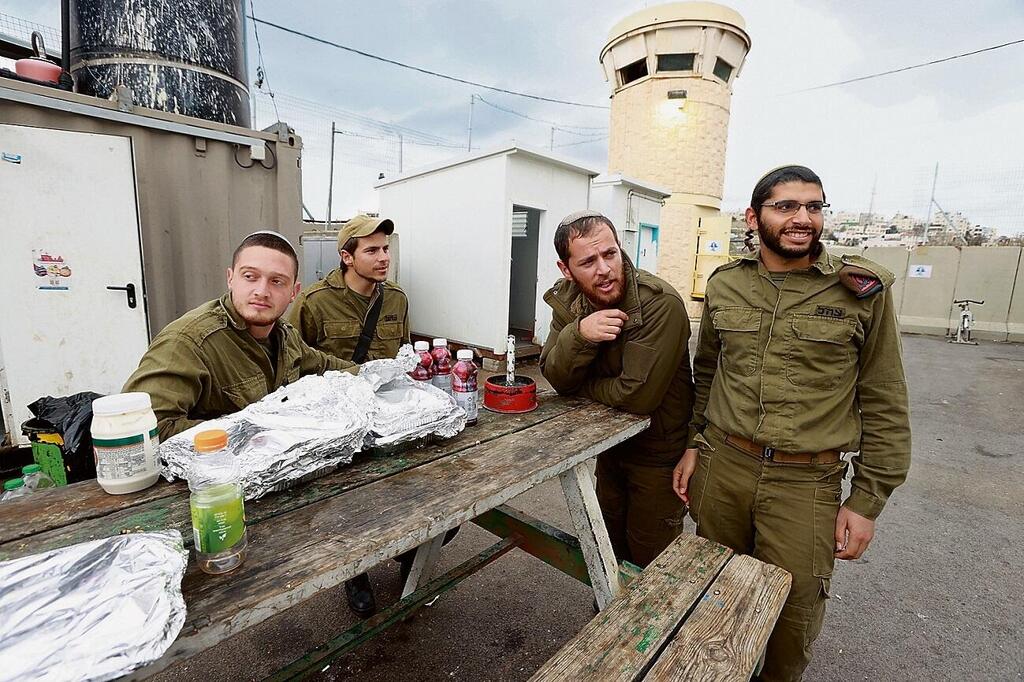

Sgt. Eitan Reisch, second from the right, and his friends from the 51st Battalion
(Photo: Shaul Golan)
A few days later, a Golani soldier was filmed assaulting a human rights activist. He grabbed him by the throat, threw him onto the ground and kicked him. Rosilio comments: “I expect each and every soldier to act wisely, responsibly and professionally towards all people. Any soldier not acting in this way will be dealt with. Soldiers from the Givati Brigade, who were stationed here before starred in similar video clips. One Givati soldier caused an uproar when filmed saying to a left-wing activist “Ben-Gvir will sort things out in this place.”
“I don’t know if he knew what he meant when he said ‘Ben-Gvir will sort things out in this place.’ What is he going to do?” Reisch asks. “I think the situation isn’t normal. We have terrorism. We do need to make order. I think he should have responded differently.”
Hacohen adds, “I hope that’s what the members of Knesset are trying to do.”
On this moonless Hebron night, the 51st Battalion’s time here has come to an end.
The wall of Zizu’s office, which had been adorned with certificates of appreciation, including the one regaling his courage at Kerem Shalom, is now stark. They’re packing up. Even the smoking corner has been loaded onto the trucks.
It’s strange leaving. This morning, everyone’s on high alert. The IDF operated in Nablus. Eleven Palestinians, mostly terrorists, were killed. There’s a heightened state of readiness. Offensive operations have been canceled. Soon after, rockets were fired from Gaza. In the days following, we witnessed the fatal terrorist attack in Huwara and the following counter-disturbances.
We set out for a final patrol in a van that creaks on the turn. We pass by 160, the checkpoint where it all happens. Not far, a local gang war flared up. Rounds of gunfire break the night silence. One of the soldiers talked about at least ten armed men. The guard at the checkpoint described it as “battles like in Fortnite.”
We continued to Giv’at Ha’avot. We passed by a building with old bikes lying around. This is Ben-Gvir’s house. “It’s very sensitive here” explains Lieut. Matti Amar, sitting next to the driver. “If they manage to shoot into the neighborhood, we’ve lost. How would it look if they shoot at the house of an Israeli government minister?”
But now, in Harsina, dull clouds descend over the view into the Palestinian neighborhood
Zizu smiles. He doesn't have that suspicious look of his. Here, in this crazy city, his life has taken a turn. He holds no grudges and he’s now talking about being discharged this summer.
Oh, and there’s the wedding. They’ve already booked a hall. The most important thing is that the bride-to-be, Meitar, says to take everything easy. He gets her on the phone. She’s pleased he’s ending his stint in Hebron. I ask if she’s happy he’s finishing the army. She replies: “What do you think? I only see him once every two weeks.”
Zizu lights up another cigarette. He quickly sums up everything that’s happened. He counts off: A car ramming, a lot of arrests, patrols, seizing weapons, Molotov cocktails, fireworks fired at the outposts and daily stone-throwing. With all the stones they threw at us, we could build the Western Wall. It’s extreme here. Everything here’s on steroids.“
He doesn’t mention on his list the incident with the fighting at the entrance to the base. I think back to what I heard on those first days - that Hebron is a city with which you can fall in love, or come out battered and bruised. Zizu tells me: “Being here builds character. We’ve benefited from being here. I’m coming out on a high, but I’m not what’s important. What matters is that people here on both sides get home safely, pray and celebrate the holidays. That’s what matters.“
“But this is your life” I insist. I’ve tired him out. There’s a moment of silence. Then Zizu just says “okay” and puts out his cigarette on the back of his shoe. “I told you. You can throw me out of a ninth-story window and I’ll land on my feet. There were people here before. There’ll be people hereafter. I’m just one more person.”
This is my last night with Zizu, Shlomo, Menachem, Eitan and the rest of the Golani soldiers. As the car meanders away and the Hebron lights fade into the distance, they’ll take something away with them. The company commander says he’s just another person and those soldiers who got into a fight. They’ll turn their hearts to God, ask him to open his eyes for the good of those guarding and protecting others.
And the night sky won’t seem so heavy.


